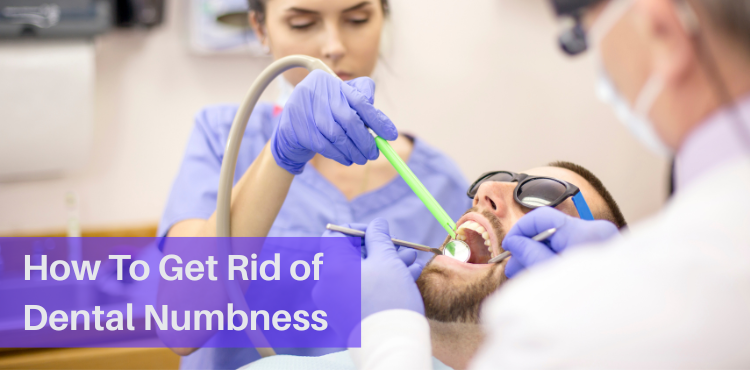
How to Get Rid of Numbness After The Dentist: Tips and Remedies That Work
Dental procedures like fillings, extractions, or root canals often require local anesthesia to keep you comfortable during treatment. While this numbing effect is crucial for pain management, it can leave you with that awkward, tingly feeling long after your appointment is over. If you’re wondering how to get rid of numbness after the dentist, you’re not alone.
In this guide, Dental Faith shares proven methods to accelerate the numbing wear-off process, answers frequently asked questions, and explores natural remedies—including tips inspired by trusted practices like Zen Dental and alternative methods like using Epsom salt for tooth pain relief.
Understanding Dental Numbness
Dental numbness typically results from local anesthetics like lidocaine or articaine, which block nerve signals in a specific area. While the average numbing effect lasts 1 to 2 hours, it can linger in your lips, cheeks, or tongue for 3 to 5 hours after your dental procedure.
Several factors affect how long the numbness lasts:
- Type and dose of anesthetic used
- The dental procedure performed
- Your body’s metabolism
- Age, weight, and overall health
How to Speed Up Numbness Wear Off
If you’re ready to feel your face again, here are dentist-approved methods to reduce numbness more quickly:
1. Massage the Affected Area
Apply a warm compress (if there is no swelling) and gently massage the cheeks or lips to increase blood flow. This simple trick encourages the anesthetic to dissipate faster. Just be careful to avoid the treatment site directly, and always wash your hands first.
2. Physical Activity
Movement boosts blood circulation, which helps your body process the anesthesia. Take a brisk walk, do some light house chores, or simply pace around the room. This is especially helpful after less invasive procedures like fillings.
3. Jaw and Tongue Exercises
Wiggling your jaw and moving your tongue side to side can help re-stimulate nerves and improve circulation. These gentle movements are particularly effective if you’re numb in the lips or tongue.
4. Stay Hydrated and Try Caffeine
Drinking plenty of water helps flush out toxins from your system. Adding a cup of coffee or tea may help too—caffeine acts as a natural stimulant that increases blood flow, potentially speeding up the numbing wear-off.
5. Ask for a Reversal Injection
Some dental offices offer a reversal agent like OraVerse. This medication helps reverse the effects of local anesthesia, sometimes cutting down numbness time by half. While not usually covered by insurance, it might be worth the $25–$75 investment if you need to return to work or socialize quickly.
Natural & Home Remedies
At Dental Faith, we understand the desire for natural alternatives, especially for those looking to avoid medications. Try these holistic remedies inspired by zen-based care approaches:
✓ Epsom Salt for Tooth Pain Relief
While Epsom salt won’t directly reduce numbness, it can provide comfort if you have post-procedural tooth pain. Rinse your mouth with a lukewarm Epsom salt solution to help reduce swelling and discomfort.
✓ Warm Salt Water Rinse
Similar to Epsom salt, a simple saltwater rinse improves circulation and supports healing. Mix a teaspoon of sea salt in warm water and swish for 30 seconds. Repeat as needed.
✓ Essential Oils
Oils like peppermint, clove, or eucalyptus can be massaged (diluted with a carrier oil) onto your cheeks for a soothing and circulation-boosting effect.

Tips from Zen Dental & Other Natural Practitioners
Zen Dental reviews often highlight their gentle, holistic approach to dentistry. Following in that spirit, consider meditation or breathing exercises to reduce anxiety while you wait for the numbness to fade. A relaxed body may process anesthesia more efficiently.
FAQs: Numbness After the Dentist
How long does numbing last after a filling?
Numbing typically lasts 2 to 5 hours depending on the type and amount of anesthetic used. Your lips and tongue may remain numb longer than the treated tooth.
Can I eat while numb?
It is not recommended to eat while your mouth is numb. You risk biting your tongue, lips, or cheeks without realizing it. Wait until sensation fully returns before eating.
What is the fastest way to get rid of dental numbness?
The fastest ways include massaging the area, staying active, drinking caffeine, and (if available) getting a reversal injection. Each method helps increase blood flow to flush out the anesthetic.
Does caffeine help reduce numbness?
Yes. Caffeine is a stimulant that increases circulation, helping the body metabolize anesthesia faster. A cup of coffee or green tea may be beneficial post-procedure.
When Should You Call the Dentist?
If the numbness lasts longer than 5 hours or if you experience tingling, burning, or signs of nerve damage, contact your dentist immediately. In rare cases, prolonged numbness may indicate a nerve injury or reaction to anesthesia.
At Dental Faith, our team is committed to ensuring your post-treatment recovery is smooth and comfortable. We’re always here to address any concerns you may have after a dental procedure.
Final Thoughts: Be Patient with the Process
While numbness after dental work can be inconvenient, it’s temporary for most people. Whether you choose to walk it off, sip some coffee, or try holistic remedies like those recommended by Zen Dental and Dental Faith, know that relief is on the way.
Dental Faith is proud to serve as your trusted family dentistry in Nashville, TN. We prioritize gentle care and patient comfort—from start to finish. Our faith-based and culturally inclusive practice ensures that everyone receives the highest quality dental experience, including expert guidance on what to do after your procedure.
